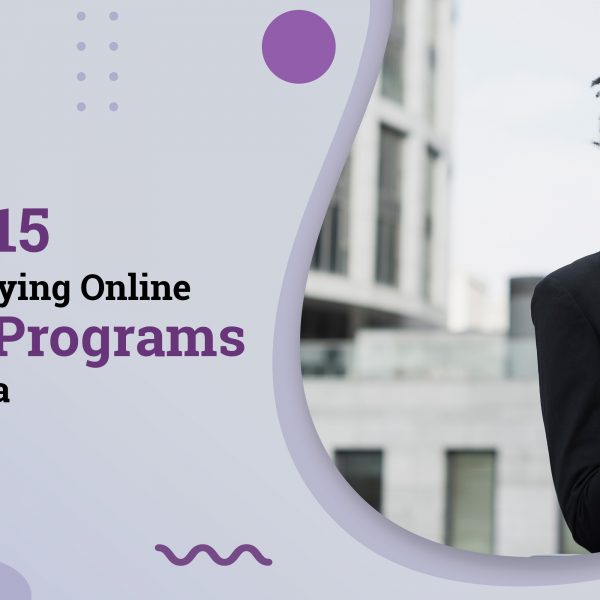Blog Summary
Counseling psychology is a specialization of psychology that deals with teaching patients to cope with emotional, physical, and mental health issues. Counseling psychology is a psychology specialization that leads patients on how to cope with emotional, physical, and mental health issues. It uses the principles of psychology to enhance the well-being of individuals, families, groups, and the community at large. A master’s degree is required to engage in counseling—the Ph.D. Program in Counseling Psychology helps counseling psychologists facilitate individuals, groups, and organizations. The program teaches learners to use prevention, intervention, and remediation strategies to help clients develop practical coping skills and responses to their environments.
- Issues addressed by a counseling psychologist
- Responsibilities
- Recruitment Areas
- Duties of a Counselling Psychologist
- Skills
- What are the career opportunities in Counselling Psychology?
- How to Become a counseling psychologist
- How does a PhD in counseling Psychology help?
- Career after PhD in counseling psychology
Counseling psychology is a specialization of psychology that deals with teaching patients to cope with emotional, physical, and mental health issues. It uses the principles of psychology to enhance the well-being and mental health of individuals, families, groups, and the community at large. A counseling psychologist is a professional who focuses on the daily life issues of the patient and helping them deal with stressful situations, teaches them ways to overcome, and motivates them to take a balanced approach.
These professionals provide stress management as well as the treatment of more serious psychological issues. Counseling psychologists work with various patient groups that include those experiencing life transitions, those experiencing crisis at work, family, or relationships. This branch is closely connected to clinical psychology and counseling.
Counseling psychologists view individuals as those who create their change and adopt a holistic and client-centered approach considering the socio-cultural factors that are unique to the individual.
Issues addressed by a counseling psychologist
- Problems at school and conflicts at work
- Issues with making career decisions and coping with retirement from work
- Marital and family disputes
- Managing difficulties in learning and picking up skills
- Dealing with stress and managing stressors of daily life
- Conflicts arising within an organization
- Enduring physical injury, disability, and disease
- Compromising on a personal/social level
- Developing a sense of self-understanding and awareness
- Interpersonal relationship issues
- Psychological disorders
Responsibilities
- Carry out an assessment of mental status, risks and understand appropriate needs and testing to determine if a person fits a role.
- Formulate a psychological summary of the client’s issues
- Establish a good client rapport based on trust and respect
- Plan and execute specialist treatments to help clients to understand their feelings/behavior
- Empower clients to address, take control of issues and make positive changes to their behavior
- Monitor and evaluate treatment outcome
Recruitment Areas
- Rehabilitation Centers
- Psychological Research Centers
- Advertising Industry
- Teaching
- Welfare Organizations
- Psychological assessment and testing
- Research Establishments
- Development of prevention programs
- Forensics
- Universities/schools
- Child/ Youth Guidance Centers
Duties of a Counselling Psychologist
To identify and research human behaviors and emotional patterns.
- Use tests and assessments to help in diagnosing a mental health condition
- Gather information through observations, interviews, surveys, and other methods.
- Search organizational, psychological, emotional, behavioral issues and diagnose disorders using information collected from their research study.
- Offer long-term counseling for those patients suffering from mental health disorders.
- Share the problems of their patients and make conclusions.
- Write reports, articles, research theory, and share collected data.
- Studies the behavior and brain functions.
Skills
- Interpersonal and psychotherapeutic skills
- Excellent communication skills
- Counseling skills
- A sensitive approach when dealing with clients
- The ability to a part of a team
- Independent and self-motivated
What are the career opportunities in Counselling Psychology?
- Adolescent Psychologist
- Career Counselor
- Child Psychologist
- Counselor
- Educational Psychologist
- Clinical psychologist
- Online counseling
- Marriage and family therapy
- Mental health counseling
How to Become a counseling psychologist
Step 1: Choose any Stream with Psychology in Class 12th
Any stream in class 12is fine with psychology as a subject. The science stream comprising physics, chemistry, and biology also makes you eligible. It gives you an edge when dealing with the physiological and neurological aspects of Psychology.
Step 2: Take up B.A/B.Sc in Psychology or Applied Psychology
The next step is pursuing an undergraduate degree in psychology that will focus on gaining knowledge in general psychology, abnormal psychology, counseling psychology, personality psychology, and statistics useful for a career in counseling. Do as many internships in the department to get hands-on experience. It will display your dedication to the profession and put you on to professionals who can help you gain experience and advance your career.
Step 3: M.A/ M.Sc in Counselling Psychology/Psychology/Applied Psychology for two years
A master’s degree is required to acquire practical knowledge and engage in counseling. It will focus on counseling theories, social and cultural diversity issues in counseling, career development and counseling, research methods, and much more. You’ll also need to complete internships and submit dissertation work to meet the criteria to receive the degree.
Admission to these institutions will be through entrance exams or your marks in graduation along with the interview. In addition, you may also take up psychology for your master’s even if you have not studied it at the undergraduate level.
Step 4: Get a PG Diploma in Guidance and Counselling for one year (Optional )
It is an extra measure to step up your counseling skills and gain practical knowledge and a professional diploma and certification in counseling. It is primarily of use to someone who does not have a master’s in psychology but wants to be a counseling psychologist. The course must be Rehabilitation Council of India (RCI) recognized.
The masters level offers the following specializations:
Clinical Psychology: These specialists analyze a person’s mental status and help them achieve a state of normalcy. They work in hospitals and clinics and deal with anxiety, depression, relationship issues, etc., and clinical conditions such as schizophrenia, psychosis, etc.
Organizational Psychology: Organizational psychologists work for corporates and aim at maintaining harmony in the work environment. They contribute to the training and development of the company.
Social Psychology: They work for the welfare of the society, targeting areas having issues like poverty, lack of disease awareness, domestic violence, etc.
Health Psychology: Health Psychologists are those that work with patients suffering from life-threatening and debilitating diseases. They deal with patients and their families under the profound stress of living and dealing with such diseases.
Counseling Psychology: This is one of the most intriguing and deals with everyday issues. Relationship issues, family problems, difficulty in adjusting to a new environment are some of the common problems dealt with by them.
How does a PhD in counseling Psychology help?
The Ph.D. Program in Counseling Psychology helps to enable counseling psychologists to facilitate individuals, groups, and organizations. The program teaches learners to use prevention, intervention, and remediation strategies to help clients develop practical coping skills and responses to their environments.
Your studies will involve broader principles, and you’ll do a lot of project work. You’ll also need to complete a dissertation as part of your degree program. There might be an internship or field placement with a Ph.D., though it’s not always required.
The program equips students to meet the following profession-wide competencies:
Doctoral students need to:
- Develop and grow to gain an independent ability to formulate research or other scholarly activities of a particular standard to contribute to a psychological or professional knowledge base.
- Conduct research or other scholarly activities.
- Disseminate and do a critical analysis of research or other scholarly activity through professional publication and presentation at the local, regional, and national levels.
- Be knowledgeable of and act by each of the following:
- the recent version of the Code of Conduct and ethical principles of psychologists
- relevant laws, regulations, rules, and policies
- applicable guidelines and
- standards
- Recognize ethical dilemmas and resolve the dilemmas.
- Ethically maintain self in all professional activities.
Aspirants must demonstrate knowledge, awareness, sensitivity, and skills when working with diverse individuals and communities who personify various cultural and personal backgrounds.
They also have to understand
- how their history, attitudes, and biases may affect how they understand and interact with people different from themselves.
- the ability to integrate awareness and knowledge in professional roles such as research, services, and others.
- the ability to work with individuals whose demographic characteristics or worldview conflict with theirs.
Admission Requirements for Counseling Psychology PhD Programs
Each institution has its entry requirements for counseling psychologists. The PhD programs are very competitive, and a lot of institutions will ask for:
- Certificates from your previous education
- Letters of recommendation
- Writing samples
- An essay about your career goals
- A resume of your work and educational experience
- A formal interview
A PhD can earn about 1.8 lakhs per annum to 6. 25 lakhs per annum.
The Ph.D. program in counseling psychology takes about 3 to 4 years to complete. It teaches the necessary skills, tools, and techniques used by professionals in counseling to deal with their clients.
In addition to completing the coursework listed below, students must complete a dissertation to be submitted to the institution to complete their doctorate.
- Crisis counseling
- Advanced psychopathology
- Social issues in counseling
- Cognitive-behavioral therapy
- Statistics
- Research methods
- Life coaching
- Psychology career development
- Personality assessment
Career after PhD in counseling psychology
Completing a PhD in the psychological counseling field graduates for career advancement in positions as educators, clinical researchers, psychology specialists, counseling consultants, and more. An online PhD in counseling psychology is as good as a PhD earned through a campus program and leads to the same career opportunities.
Earning a PhD in counseling psychology online will take about 3 or 4 years, with the addition of on-campus components such as residencies and internships. Students will complete courses with topics ranging from crisis counseling to statistics to prepare for careers as educators, specialists, counseling consultants, and other related professions.
The demand for psychology is on the rise and will only increase in the future. You will see psychologists working in various areas ranging from NGOs to schools to corporates and, of course, health facilities and sports teams where they contribute significantly.
Psychologists act as the mastermind behind marketing themes for top advertising agencies. They analyze and give input in mind what will work for their target audience.













